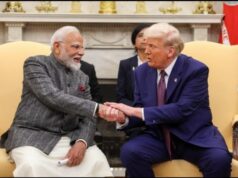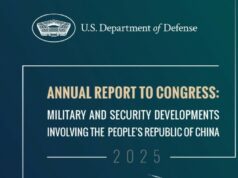External Affairs Minister Dr. S. Jaishankar, who represented India at the inauguration of Donald J. Trump as the 47th President of the United States, participated in a series of high-profile diplomatic engagements aimed at deepening the U.S.-India strategic partnership.
Dr. Jaishankar’s presence at the swearing-in ceremony and associated events emphasized India’s growing stature in U.S. foreign policy priorities. Attending the inaugural prayer service at St. John’s Church, he also engaged in several formal and informal discussions during the day’s festivities.
In their first bilateral meeting, Dr. Jaishankar and Secretary of State Marco Rubio reaffirmed their shared commitment to enhancing the U.S.-India partnership. The discussions highlighted areas such as defence cooperation, critical and emerging technologies, energy collaboration, and advancing a free and open Indo-Pacific.
Secretary Rubio, a long-time advocate of stronger U.S.-India ties, expressed the Trump administration’s intent to address key economic and migration issues while expanding trade and investment opportunities.
In another pivotal meeting, Dr. Jaishankar met U.S. National Security Adviser Mike Waltz to discuss strengthening ties in areas of mutual benefit. Their discussions emphasized ensuring regional stability, countering security threats, and fostering a cooperative approach to global challenges.
One of the highlights of Dr. Jaishankar’s visit was his participation in the first Quad ministerial meeting of the new administration.
Held just hours after the inauguration, the meeting included foreign ministers from Australia and Japan, underscoring the alliance’s significance in addressing Indo-Pacific challenges. The discussions focused on enhancing maritime security, countering emerging threats, and strengthening cooperation to maintain a free and open Indo-Pacific.
Dr. Jaishankar’s engagements showcased the deepening U.S.-India relationship, with particular attention to defence partnerships and the shared vision for a rules-based order in the Indo-Pacific. The two nations emphasized the importance of expanding economic ties and resolving migration challenges to foster stronger people-to-people connections.
Focus on Regional Stability
Both sides reiterated their commitment to countering security threats in the region, including terrorism, cyberattacks, and coercive activities undermining maritime freedom. India’s role as a key security provider in the Indo-Pacific was highlighted as the Trump administration signalled its readiness to work closely with New Delhi.
Dr. Jaishankar’s high-level meetings underscored the importance of U.S.-India cooperation on global challenges, from climate change to technological innovation.
Separately, Dr Jaishankar met Australian foreign Minister Penny Wong, to discuss enhancing bilateral ties and collaborating on regional security issues, and Takeshi Iwaya, Japan’s Foreign Minister, with whom he discussed reinforcing the strategic partnership between Japan and India, with an emphasis on cooperation in defence and technology sectors
Other key leaders in the new administration that Dr Jaishankar met included Kashyap (Kash) Patel, President Trump’s nominee for Director of the Federal Bureau of Investigation.
He also met Speaker of the U.S. House of Representatives Mike Johnson, who plays a pivotal role in legislative proceedings, and discussed legislative support for initiatives aimed at strengthening U.S.-India relations, and U.S. Senate Majority Leader John Thune, to explore avenues for bipartisan support to enhance strategic and economic cooperation between the two nations.
,
In a career spanning three decades and counting, Ramananda (Ram to his friends) has been the foreign editor of The Telegraph, Outlook Magazine and the New Indian Express. He helped set up rediff.com’s editorial operations in San Jose and New York, helmed sify.com, and was the founder editor of India.com.
His work has featured in national and international publications like the Al Jazeera Centre for Studies, Global Times and Ashahi Shimbun. But his one constant over all these years, he says, has been the attempt to understand rising India’s place in the world.
He can rustle up a mean salad, his oil-less pepper chicken is to die for, and all it takes is some beer and rhythm and blues to rock his soul.
Talk to him about foreign and strategic affairs, media, South Asia, China, and of course India.




